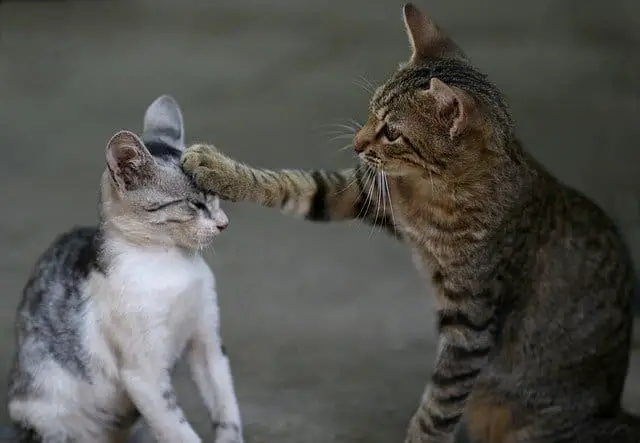
Having a cat is good… But having two, is it better? It is of course tempting to answer yes, because it often happens that we want to adopt a new sidekick precisely to give company to a cat who already lives in our home. Unfortunately, cats being what they are with their little character (and that’s why we adore them), cohabitation is sometimes far from going well. Since it is absolutely out of the question to abandon one of these cats, how can we make sure that these cats at least deign to live together without scratching the claws?
Think carefully before adopting a new cat
We cannot repeat it enough: the adoption of a cat – or any other animal for that matter – must be the result of a deep reflection, and commits us to life with our animal. In the case of a second cat, it is also advisable to make sure that our cat will be able to accept this new presence.
Once this time has passed, you have decided to take the plunge and welcome a second furball at home. The presentations are made in good and due form, in a progressive way, but there it is, nothing helps. Impossible that these two find themselves in the same room without bristling their hair or sticking out their claws …
Give them time to get to know each other
How long does it take to worry about two cats not getting along? In general, it is agreed that it takes about 6 to 12 months for them to become familiar with each other. Of course, this is not an exact science because it all depends on their character. When it comes time to introduce the new kid to the household, do not force them to cohabit .
And then, it all depends on their degree of animosity towards each other … Whether the relationship is simply strained or that it systematically degenerates into a claw battle, the easiest thing is to do a strategic job of separation. If their aggressiveness puts them in danger, physical separation is inevitable when you leave them alone at home: each their room!
The right gestures

In short, it is a matter of giving cats a space of their own, and also of defusing – even anticipating – tense situations. And this can be done in several ways.
Have several bowls and litter boxes
Arrange the bowls and litter boxes for each of your cats from one end of the same room to the other. Thus, they will not feel threatened by each other in terms of sharing land and food resources. Rather, spending time in the same room for positive things can bring them closer together. Also, increasing the number of places where they can eat helps reduce their stress when it comes to sharing food.
Provide them with resting spots
Arranging several nooks and crannies in the house is also an excellent solution. The cats will thus be able to isolate themselves easily from each other, while having a privileged space in which to rest quietly.
Avoid certain stimuli
Avoid catnip if it is too exciting for one of your cats. This would risk increasing their aggressiveness, and therefore maximizing the chances of conflict! Conversely, you can use pheromones to soothe and reassure them.
Don’t neglect the game
It is also very important to give each cat equal playing time. You can indeed get them to mingle during these periods while relaxing. Otherwise, don’t neglect to divide your time equally between them so as not to create or maintain jealousy.
When you leave the house, make sure they have enough toys to individually care for and distract from each other. Then, why not try to play with both cats at the same time ? The game can indeed gradually replace the fight.
Reward your cats
If you see an improvement in their relationship, whether through play or through habit, congratulate your roommates for the social efforts they have made. Use the reward – a treat will do just fine – to make them associate their good behaviour with positive feelings.
Consider sterilization
It is a clearly more invasive remedy, which deserves further reflection. But it has been proven that unsterilized cats are more often aggressive than others. Therefore, this solution can be discussed with a veterinarian who will help you make a decision.






